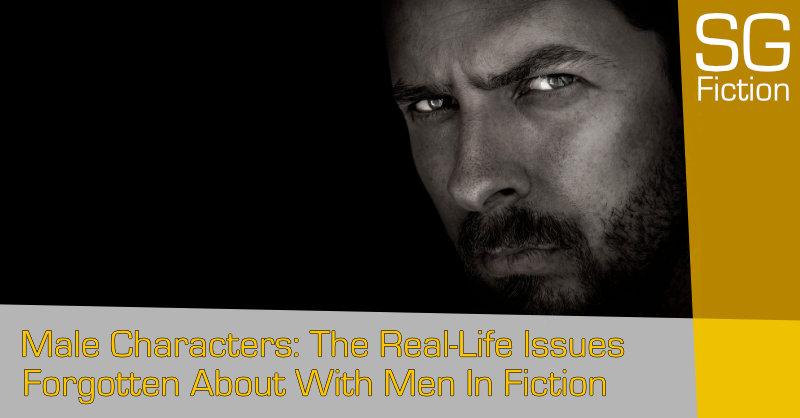Male characters have been relegated in entertainment recently. In real-life, men face many issues that can be forgotten about in fiction. Here are five examples of traits men face that could be further represented in fiction.
In this Male Characters article, you will find information on the following areas:
- What it means to ‘be a man’ and why having men portrayed as brutes or bullies is unhealthy for young men today,
- Why pressure of financial success can warp what it means to be successful in modern-day life, leading to low self-esteem in young men,
- How raising boys to become men is becoming more complex than ever before, especially within the current political climate,
- Being ‘Just A Dad‘ is seen to be a stigma in the modern world, leading to men feeling emasculated and unimportant,
- Are we ageist with the male character? As populations in the developed world live longer, should there be more older characters in the fiction we write?
Read the rest of the Male Characters article and consider whether the men in your books could be more representative of men in the real world.
Male characters are considered to be a secondary feature in many leading TV shows and movies that are created by those in charge at Lucasfilm and the BBC. With terms like ‘down with the patriarchy’ and ‘toxic masculinity’ being used daily, it is unfair to tar an entire gender with the traits of a minority of rich white men in Hollywood.
Both men and women regularly face issues that may not always be worthy of being included within the pages of the latest fiction novel to hit the shelves. However, some could add to the fabric of a character that we are writing or, more powerful aspects, could be written into the main elements of the story itself.
When writing fiction, we all know that the development of strong characters is at the core of creating a compelling story. It is these characters that the reader will follow through your novel. The reader will experience the world you build through the senses, feelings, and emotions that your characters have about the world they inhabit.
As a fiction author, I look to write characters who have genuine strengths and weaknesses that the reader can relate to. When writing science fiction novels, it can be hard to make every aspect of the characters relatable, but it is through developing their core character traits and backstory that I ground them in the real world. This is how we can share some of the less-common characteristics and issues that both female and male characters may face within our books.
This blog is the first collaboration with a female writer, Lauryn Trimmer. Lauryn’s Pro Story Builders blog will house the twin article to this, where she shares her thoughts on what some authors forget about women in fiction.
In this creative writing blog article, I will share my thoughts on some of the real-life issues and traits that could be forgotten about with male characters in fiction. By sharing some of these, I hope to give you some further ideas when it comes to your character development so you can craft men in a novel who are well-rounded and showcase male characters in a new light.

What It Means To ‘Be A Man’
In recent years, the media and Hollywood have portrayed men in something of a polarising manner. An entire gender has been shown as being one of three variations of a caricature:
- The brutish, predator or bully who abuses power and takes advantage of others is boring. One example is that of Luke Skywalker in the Disney Star Wars trilogy, who abuses his trusted position with his nephew and tries to kill him in his sleep. Particular other real-life examples of such men can be seen within the billionaire elite or Hollywood executives that have been well reported in the press.
- The over-sensitive ‘snowflake’ who is offended by everyone, and everything can be a pain. The recent social movements and cancel culture have seen many men across the world, having to apologise for opinions that aren’t toxic or dangerous. Yet, we see that online groups of men appear to be outraged at that person’s opinion because it doesn’t agree with their own. This can lead to lives being ruined as a torrent of abuse is targeted at figures for doing very little to deserve it.
- The infallible, superhero-like man, who is exceptionally financially successful or a superhero can be tedious. This portrays that a man’s life has to be a certain way for them to be deemed a ‘success’. When it comes to young men seeing such interpretations of their gender, it can cause them to view their own lives in a distorted manner, leading to mental health issues and depression.
If the entertainment world portrays male characters in such a manner, what does it say to those young people growing up today? When men are portrayed to such extremes, it gives no sense of realism for generations of men and boys out there who need to see positive male role models on the screen and in fiction.
Men should be portrayed as complex, nurturing human beings. They should be multi-faceted and offer the readers or viewers a fleshed-out person who is capable of more than what specific areas of the media paint them to be. As a male who worked in education for fifteen years, the role of the man in such positions is vital. Young men need to see male characters and men in society who are pillars rather than pariahs.
What Can We Learn From This As Writers?
Authors should always strive to write the most complex and rounded characters they can. Consider the following points when writing your next male characters, so you don’t write yet another chauvinist or bully.
- Showcase some of the positive traits of men in your personal life. If you had a grandfather who was there for you when your father wasn’t, make him the focus of the story rather than the absentee father.
- It’s easy to write characters that fit into certain troubles in society with the hope that you can raise a flag to get a few retweets and likes on social media. Remember, not all men are the predators and bigots that the media portrays. To ‘be a man’ means more. Show the inclusive side, the loving side, and the diverse men from all sides.
Pressure Of ‘Financial Success’
In a world that is becoming increasingly materialistic, where children dream of being YouTubers and social media influencers rather than doctors or even footballers, there is no doubt that money talks. The label of being ‘successful’ is often misconstrued to being rich and having financial wealth, leading to young people feeling the need to make financial gains all costs.
Many men can be made to feel inadequate or a failure because they don’t earn enough. It is seen with the clothes we wear, the cars we drive, and the technology we sport on our wrists and in our pockets. However, success has to be measured against other, more realistic benchmarks that have weight in the everyday world.
Traditionalists still view men as being the ‘breadwinner’ and that the female of the house should be a homemaker. There can sometimes be an element of embarrassment for men earning less than the women in their lives. Why should it be viewed as a weakness for men to earn less than their female partner in 2020?
Financial success does have a role within the professional society we live in today, but it shouldn’t be the be-all and end-all. We should look to highlight the positions held by men in a society that are vital within communities that may not be as glamorous or newsworthy. Those of us who are social workers, youth workers, and teachers play a crucial role in moulding the minds of young people. Why can’t male characters like this me more prominent in fiction?
What Can We Learn From This As Writers?
Money isn’t everything, yet it can bring immense happiness and also pain. Consider the following points when writing your next male characters to show an element of realism in your stories.
- The ‘American Dream’ is a term that is synonymous with success and wealth. Yet, millions of Americans live lives that wouldn’t equate to such a statement. By breaking down the traditional values of how a man should earn X to be a success, we can allow for multiple ‘normal’ male characters to showcase genuine heroism and guile.
- In a post-Covid world, many changes will come about from the fluid situation inside a pandemic. Therefore, is financial success seen as a badge of honour or disgrace in such times? With millions starving around the world, would rich male characters be well received?

Raising Boys To Become Men
All across the UK and US, many young men growing up in broken homes. With so many young lives disrupted at a vital age, they must have deep-seated respect not only for women but also for themselves and fellow males in society. If boys are not raised to become men, it leads to repetitive cycles of social immobility and inequality.
Many angry young men from such backgrounds can feel disillusioned with life and society as a whole, turning to violence and crime. This can be seen in areas like inner-city London, Manchester, and Belfast throughout The Troubles. It is in situations like these that young men desperately need positive male role models who can be a testament to the fact that there is another way to being a success in life. By turning their cheek to the easy money or gang life, those men showed a strength that many around them didn’t have.
Rather than demonise the father figure, portraying them as a deadbeat or a bully, there has to be a better way to characterise men like this. Yes, there are men like that out there, but is it not lazy writing to pick the low-hanging fruit with your male characters in such situations? Personally, as someone who was brought up by his mother, such storylines strike me as annoying and condescending.
What Can We Learn From This As Writers?
The coming of age story has always been a success on the screen as well as in books. Consider the following points when writing your next male characters and consider whether you can craft male role models rather than monsters.
- On the screen, movies and TV shows about gangs can sometimes be seen as glorifying the gangster lifestyle. Whether you believe this or not, having male characters who buck the trend or help divert young people away from such a lifestyle could highlight the issues in those communities better than violence.
- There are a plethora of ‘deadbeat dad’ movies and stories out there. We see vastly more men demonised in such situations over women. Could a man have to leave his family because a female domestically abused him? Would such a story be more interesting than the old ‘dad got drunk and left’ scenario?
Male Characters Being ‘Just A Dad’
Just as women earning more than men in the household can be a taboo topic, so is the subject of fathers taking up the role of a house husband or stay at home dad. Fathers who choose to be actively engaged with the raising of their children over a career should be celebrated.
There is no doubt that women have a much more extensive support network when they decide to be a stay at home mother. As this is seen to be much more normal, there are more female friends or older family members who can be called upon for advice. Many of these ladies do a fantastic job and manage to juggle tens of responsibilities while putting everyone else in the family above themselves.
However, when it comes to a man being a stay at home dad, they can be seen as lazy when they choose to take time to raise their children. If their female partner then takes on the role of the ‘breadwinner’ the man can be seen to have little or no drive and direction in life. Is this a balanced viewpoint? Of course, it isn’t. All parents who decide to make such a choice should be celebrated. Yet, how many male characters are portrayed as amazing dads, rather than morons who can’t change their baby?
What Can We Learn From This As Writers?
Real-life family stories can bring about waves of emotion that others simply can’t. Consider the following points when writing your next male characters and see if you can write a dad who was larger than life.
- There are many awesome fathers out there! Some who have had to raise their children due to the death of their wife from diseases like cancer. Such fathers are heroes and have to fill the void left by a mother taken before her time. How could these male characters make a better impact when compared to the deadbeats we see all too often?
- In a world where ladies are making considerable strides in the boardrooms and their careers, how could you write a male character to show that he supports his wife’s job? Having such men be seen as a supporting figure in their wife’s career could be refreshing.

Are We Ageist With The Male Character?
Both older and younger men can feel alienated within society, and there is no doubt that this is an issue that has not gone away. Whether you are in your twenties or your seventies, there may be many gripes to be voiced about the world you find yourself in.
Those of us who are older men are expected to retire at an age that is determined by ‘the norm’ and can feel they play a lesser role in the world. Therefore, these gents feel the need to take up volunteer roles with charities and organisations to have a routine every day.
On the other hand, younger men often experience difficulty in achieving their desired grades in exams to get employed. This external pressure can lead to stress in the lives of teenagers and new adults that can be detrimental to their health. Also, now that businesses look for practical experience as well as a university degree, this means that young people can have a top-class university education, but find it almost impossible to get employment due to a lack of experience in the workplace.
When it comes to the stories we tell with our male characters, it is an interesting point to consider whether we are ageist in relation to the people we choose to write about in our fiction. Do we simply select the male characters because they fit into a particular niche or trend, rather than write the most interesting character we can?
What Can We Learn From This As Writers?
I often find that the older generation is very under-represented on the screen and in stories. Consider the following points when writing your next male characters and consider making him that little bit older.
- If you’re writing a story from a young person’s point of view, how can you portray their grandparents? Rather than a wise person whose best years are behind them, why not look at some of the fantastic older people in society and include traits of their personalities to make those male characters stand out?
- For younger male characters, it’s too simple to write teenagers who are ideal ‘Mary Sues’ who are loved by everyone. As an educator, I know how teenagers are extremely complex people who can be temperamental, emotional, and extremely creative. Teenagers deserve to be written with complexity, not an ideal world view where everyone loves them.
Male Characters: The Takeaway
There is no doubt that the roles of males and females are changing in society. Therefore, the art that is created as a result needs to evolve along with it.
The world we are living in now is much more different from that our parents and grandparents grew up in. Male characters in books would have been written in ways that appealed to that audience at that time. This would mean the readership would have felt a greater connection to the men in those stories, as they would have lived lives similar to those characters.
In recent times, there have been multiple cases of movies and novels from the past being seen as ‘outdated’. Some have even been called racist or sexist in their portrayal of characters or society at that time. Whether these debates are right or wrong is beside the point. What is noticeable is that the beliefs, attitudes, and politics of society have changed dramatically, leading to the offence being taken today.
In fifty years, readers may look back at the books written today with similar feelings. Some may look at positive discrimination as a form of racism. Others may see ‘cancel culture’ as a form of fascism. We don’t know how the world will see our stories or the male characters within them. All we can do is write the stories we wish to share with the world with male and female characters that reflect the times in which we are living.
Ensuring our male characters and female leads have real struggles and issues is paramount to how they will be received by those who read our books. To show that men in fiction can be complex, caring, and be able to communicate emotions, where they are labelled as ‘ists’ or ‘phobes’, is central to making sure men are represented fairly in fiction.


Thanks for the mention! Great post. I will definitely keep these things in mind as I write.
Thank you, Lauryn. Was great working with you! Learned a lot and loved your article from a female’s perspective.
Good post. Writing about male characters these days is far more complicated than it used to be. I’ve been circling around this topic for awhile now. Writing about it directly sounds too much like whining, but hey, how can we complain about the shoe finally being on the other foot? Yet the realities of it can be brutal for young men coming of age in this confusing time.
I wrote a bit about it in my blog, but your article focusing on the challenge of writing male characters approaches it from a very intriguing angle.
Thanks for the message, Dale. Yes, we don’t want to sound like we’re complaining. However, as an experienced educator, both young men and young women need positive role models. Fiction and movies have a responsibility to portray both genders in a manner that is acceptable, giving balance to how they are viewed by impressionable minds. Keep writing and I appreciate the comment.